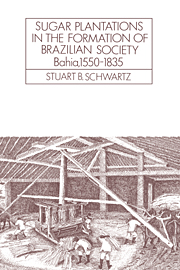Book contents
- Frontmatter
- Contents
- List of figures, maps, and tables
- Preface
- Abbreviations and special terms
- Weights and measures
- Dedication
- Part I Formations, 1500–1600
- Part II The Bahian engenhos and their world
- Part III Sugar society
- Part IV Reorientation and persistence, 1750–1835
- 15 Resurgence
- 16 The structure of Bahian slaveholding
- 17 Important occasions: the war to end Bahian slavery
- Appendixes
- Notes
- Glossary
- Sources and selected bibliography
- Sources of figures
- Index
- CAMBRIDGE LATIN AMERICAN STUDIES IN PRINT
17 - Important occasions: the war to end Bahian slavery
Published online by Cambridge University Press: 05 May 2010
- Frontmatter
- Contents
- List of figures, maps, and tables
- Preface
- Abbreviations and special terms
- Weights and measures
- Dedication
- Part I Formations, 1500–1600
- Part II The Bahian engenhos and their world
- Part III Sugar society
- Part IV Reorientation and persistence, 1750–1835
- 15 Resurgence
- 16 The structure of Bahian slaveholding
- 17 Important occasions: the war to end Bahian slavery
- Appendixes
- Notes
- Glossary
- Sources and selected bibliography
- Sources of figures
- Index
- CAMBRIDGE LATIN AMERICAN STUDIES IN PRINT
Summary
But it is true old Marx
that history is not enough
Important occasions,
man makes them.
It's a real live man who does it, who masters it who will fight
History by itself does nothing, dear friends.
It does absolutely nothing.
Heberto Padilla (1971)At the beginning of the nineteenth century, Bahian society had reached a breaking point, a moment when the political and economic contradictions of a headlong export boom constrained by colonial restrictions seemed to sow the social and demographic seeds of its own destruction. Sugar's rapid post-Haitian recovery, the expansion of the world of the engenhos, and the rising wave of African imports combined with the political changes brought about by the transfer of the Portuguese court to Brazil and the subsequent development of nationalist and republican sentiments to create conditions of instability and unrest. Between 1790 and 1837, Bahia experienced turmoil unprecedented in its history, or in the history of Brazil for that matter. Here was a slave society in the midst of disintegration, a social fabric rent by ancient injustices and present animosities. But despite the strains, the conflicting interests, the political shifts, and the violence, this society held together and survived the crisis to reach another period of relative stability. Institutions and forces of social control had been mobilized to protect the existing order, and the hierarchies and divisions that structured social life provided barriers to any sharp change.
- Type
- Chapter
- Information
- Sugar Plantations in the Formation of Brazilian SocietyBahia, 1550–1835, pp. 468 - 488Publisher: Cambridge University PressPrint publication year: 1986



